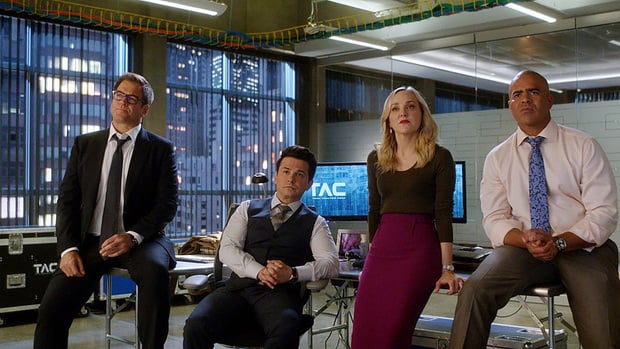Hints of Truth, But a Lot of Bull
Dr. Jason Bull, a trial scientist and jury consultant who has all sorts of tricks up his sleeve.
November 06, 2018 at 05:51 PM
6 minute read

It's not every day that I'm asked to review a television show co-created, produced and written by my former boss, Dr. Phil McGraw. “Bull,” the not-so-new CBS drama features Dr. Jason Bull, a trial scientist and jury consultant who has all sorts of tricks up his sleeve. He dances around the rules of procedure and doesn't seem to care about ethical guidelines. But hey, the show would be ridiculously dull if it weren't a gross exaggeration of the world of jury consulting. So instead of “dull,” we have “Bull.”
Despite the blatantly unrealistic accoutrements, e.g., the swanky, tricked-out office technology, a diverse staff (prosecutors, FBI investigators, NSA hackers, neurolinguistics expert/sex therapist, and even an ex-NFL-player-turned-Vogue-fashion-stylist), and having wireless ops-like communications with his team while sitting at counsel table during trial, the show does have nuggets of realism.
This week's episode, “A Girl Without Feelings,” centered around a young woman named Tally, a former patient of Bull's who had been diagnosed as a child with anti-social personality disorder (in layman's terms, a sociopath). She was on trial for violently murdering her brother with a pair of scissors, an event she has no memory of, perhaps due to her history of dissociative fugue states (aka blackouts with amnesia). The challenge? Convincing a jury to accept Tally's insanity defense and to create sympathy for someone who simply does not and cannot “feel” like regular people.
First nugget of truth: A defense of “I didn't do it” is (rarely) enough. Jurors want more.
Although Tally had a Fifth Amendment right not to testify, Bull knew that jurors would want to hear from her. And he's right. This is by far the most challenging aspect of criminal law: the law says one thing, but jurors expect another. And finding jurors who have the self-discipline to not judge a defendant who chooses not to testify is a whole 'nother challenge (and another article).
Jurors in any type of case need to hear evidence that gels with their views of the world and how things work, or how they think it should work. This is true in criminal matters, but also in breach of contract, negligence, and, yes, even patent disputes. Jurors need an alternative theory that they can wrap their arms around and hold on to during deliberations. Facts are more persuasive when they're part of a powerful story, and Bull got that one right.
Second nugget of truth: The need to create sympathy for the defendant.
Bull and his team go to great lengths to present testimony aimed at helping jurors identify with the defendant, Tally. This is smart strategy no matter who's on trial, sociopath or not; however, it's not nearly as easy as the trial team made it look (duh). Granted, the rules of procedure were generally tossed out the window, but Tally was able to accomplish something that would be almost insurmountable in the real world: through her own testimony, she turned her utter lack of sadness over her brother's gruesome death into an opportunity to educate jurors about her world and create empathy for what she experiences. In a matter of mere seconds, Tally shifted the victimology from the deceased to herself. This is what every defendant should aspire to do. How one gets there depends on the case, but humanizing the defendant is an absolute must. And if the defendant is a corporate behemoth, it's all the more important.
Third nugget of truth: Sometimes, objections don't matter.
There was a pivotal scene during the trial where Benny (ex-prosecutor-turned-in-house-trial-attorney for Bull) was questioning a key witness. Without giving away the details, suffice it to say that Benny takes the witness through a series of fairly mundane questions to set the stage. Then he goes in for the kill: “Isn't it reasonable to suspect that any one of a number of people could have killed your friend Torin?”
The prosecutor has a fit, passionately objects and, of course, the judge sustains. But guess what? It doesn't matter. The jury heard the question, and whether instructed to disregard or not, they are already thinking about the reasonableness of that scenario. Sometimes, the answer simply doesn't matter. The question does.
Biggest Bull Moment
Being television, there are lots of exaggerations and inaccuracies in “Bull,” but one of them made me laugh out loud.
But first: SPOILER ALERT.
The trial team initially decides the only plausible defense is not guilty by reason of insanity, after all, the physical evidence seemed overwhelming, the defendant had zero recall, and she had a convenient history of blackouts. It was all they had, until the state's expert handed them a gift by testifying that the blood stains all over Tally were most likely from “a moment of remorse” in trying to save the victim.
Aha!!! Remorse! A feeling that, according to Bull, Tally is incapable of feeling. In typical TV-drama form, Bull convinces Benny (during a break) to change the plea midtrial to not guilty. Wait. What? In the real world, the jury would have been told as early as voir dire that Tally did, in fact, commit the murder but should not be held criminally responsible because of her mental illness, yet now—however many witnesses into the trial—they're now being told she didn't do it at all. Talk about inconsistent strategies. When on earth would this be feasible in real life?
But wait, it gets better.
Because this is sheer entertainment and Bull has a team of people who seem to find answers for anything and everything within hours, they just so happen to find the actual killer and put him on the stand. More procedural shenanigans. More objections. A two-second closing argument and the jury renders a not-guilty verdict.
Too bad endings aren't so neat (or quick) in real life.
Kacy Miller, president of CourtroomLogic Consulting LLC, will provide weekly reviews of new episodes of CBS' “Bull,” about an elite trial consulting firm. Miller began her career as a litigation consultant working alongside Dr. Phil McGraw, the inspiration for “Bull.” She can be reached at [email protected].
This content has been archived. It is available through our partners, LexisNexis® and Bloomberg Law.
To view this content, please continue to their sites.
Not a Lexis Subscriber?
Subscribe Now
Not a Bloomberg Law Subscriber?
Subscribe Now
NOT FOR REPRINT
© 2025 ALM Global, LLC, All Rights Reserved. Request academic re-use from www.copyright.com. All other uses, submit a request to [email protected]. For more information visit Asset & Logo Licensing.
You Might Like
View All
From Hospital Bed to Legal Insights: Lessons in Life, Law, and Lawyering
6 minute read

Nondisparagement Clauses in Divorce: Balancing Family Harmony and Free Speech
6 minute readTrending Stories
- 1Carol-Lisa Phillips to Rise to Broward Chief Judge as Jack Tuter Weighs Next Move
- 2Data Breaches in UK Legal Sector Surge, According to ICO Data
- 3Georgia Law Schools Seeing 24% More Applicants This Year
- 4After Shutting USAID, Trump Eyes Department of Education, CFPB
- 5‘Keep Men Out’: Female Swimmers Sue Ivy Leagues Over Lia Thomas’ Sweep
Who Got The Work
J. Brugh Lower of Gibbons has entered an appearance for industrial equipment supplier Devco Corporation in a pending trademark infringement lawsuit. The suit, accusing the defendant of selling knock-off Graco products, was filed Dec. 18 in New Jersey District Court by Rivkin Radler on behalf of Graco Inc. and Graco Minnesota. The case, assigned to U.S. District Judge Zahid N. Quraishi, is 3:24-cv-11294, Graco Inc. et al v. Devco Corporation.
Who Got The Work
Rebecca Maller-Stein and Kent A. Yalowitz of Arnold & Porter Kaye Scholer have entered their appearances for Hanaco Venture Capital and its executives, Lior Prosor and David Frankel, in a pending securities lawsuit. The action, filed on Dec. 24 in New York Southern District Court by Zell, Aron & Co. on behalf of Goldeneye Advisors, accuses the defendants of negligently and fraudulently managing the plaintiff's $1 million investment. The case, assigned to U.S. District Judge Vernon S. Broderick, is 1:24-cv-09918, Goldeneye Advisors, LLC v. Hanaco Venture Capital, Ltd. et al.
Who Got The Work
Attorneys from A&O Shearman has stepped in as defense counsel for Toronto-Dominion Bank and other defendants in a pending securities class action. The suit, filed Dec. 11 in New York Southern District Court by Bleichmar Fonti & Auld, accuses the defendants of concealing the bank's 'pervasive' deficiencies in regards to its compliance with the Bank Secrecy Act and the quality of its anti-money laundering controls. The case, assigned to U.S. District Judge Arun Subramanian, is 1:24-cv-09445, Gonzalez v. The Toronto-Dominion Bank et al.
Who Got The Work
Crown Castle International, a Pennsylvania company providing shared communications infrastructure, has turned to Luke D. Wolf of Gordon Rees Scully Mansukhani to fend off a pending breach-of-contract lawsuit. The court action, filed Nov. 25 in Michigan Eastern District Court by Hooper Hathaway PC on behalf of The Town Residences LLC, accuses Crown Castle of failing to transfer approximately $30,000 in utility payments from T-Mobile in breach of a roof-top lease and assignment agreement. The case, assigned to U.S. District Judge Susan K. Declercq, is 2:24-cv-13131, The Town Residences LLC v. T-Mobile US, Inc. et al.
Who Got The Work
Wilfred P. Coronato and Daniel M. Schwartz of McCarter & English have stepped in as defense counsel to Electrolux Home Products Inc. in a pending product liability lawsuit. The court action, filed Nov. 26 in New York Eastern District Court by Poulos Lopiccolo PC and Nagel Rice LLP on behalf of David Stern, alleges that the defendant's refrigerators’ drawers and shelving repeatedly break and fall apart within months after purchase. The case, assigned to U.S. District Judge Joan M. Azrack, is 2:24-cv-08204, Stern v. Electrolux Home Products, Inc.
Featured Firms
Law Offices of Gary Martin Hays & Associates, P.C.
(470) 294-1674
Law Offices of Mark E. Salomone
(857) 444-6468
Smith & Hassler
(713) 739-1250







